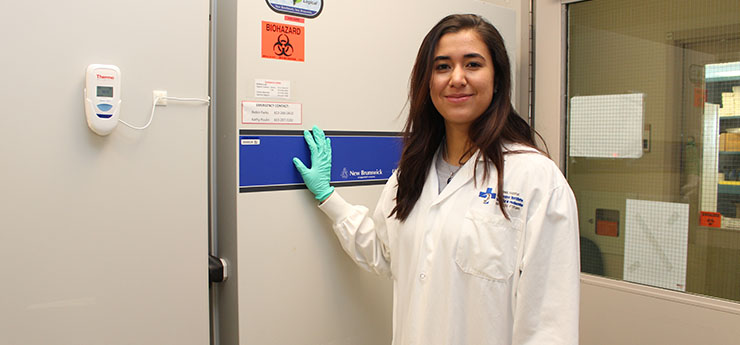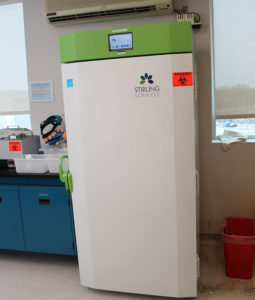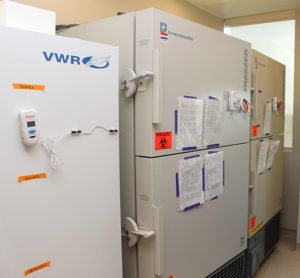
The Ottawa Hospital Research Institute needs technical equipment, such as the research deep freezers, to run its daily operations.

The new research deep freezers are used to maintain vaccines, medications, chemicals and other medical supplies at very low temperatures – as low as minus-80°C.
Researchers at The Ottawa Hospital store vaccines, medications, cells and chemicals in deep freezers – and by ‘deep’ they mean ‘really, really deep’ – temperatures as low as minus-80°C.
Just like home freezers, they become less energy efficient as they age. When the hospital replaced its 15-year-old deep freezers last year with six new energy efficient models, its energy consumption dropped to 20,138 kWh a year, and it began saving about $20,000 per year. The new freezers use 85 percent less electricity than the old freezers.
“As the deep freezers age, they become less and less energy efficient,” said Faris Rashid, Energy Manager for The Ottawa Hospital, who worked on the project with Brian Cayen, Research Digital Solutions and Operations Manager for the Ottawa Hospital Research Institute.
“They become noisier and generate more heat, disturbing the researchers,” said Rashid. “They also run the risk of failing, which means losing important contents such as vaccines, chemicals, and medications. That is why as these freezers age, it is important to have a replacement plan in order.”
In 2017, The Ottawa Hospital applied for an incentive from Hydro Ottawa through the saveONenergy program and received $14,000 to replace the aging deep freezers. The cost to replace the freezers was $80,000, making the payback period four years.
“The first freezer that was replaced in one of the labs reduced heat generation and allowed us to turn off one of the two air conditioning units, and the temperature in the room still dropped by 2°C,” said Cayen.
The Ottawa Hospital is always seeking ways to minimize its carbon footprint. Since 2003, when energy conservation measures began, the hospital has reduced its energy consumption by 6,420,108 kWh of electricity and 1,084,669 cubic metres of natural gas per year. The hospital’s facilities operate at five percent less energy intensity than the average acute care facility in Ontario.

One of the older, aging deep freezers in the research lab still needs to be replaced.
These results place The Ottawa Hospital at the forefront of sustainability when it comes to dealing with its resources. The hospital is proud to lead by example.
All the money saved by reducing energy costs and improving building performance goes towards providing a healthier environment and better care for patients. In 2014, the hospital developed a five-year Energy Conservation and Demand Management Plan to reduce overall energy consumption by 10 percent below the 2012 baseline. Since then, the hospital has partnered with Energy Star to promote installing energy efficient products like lights, windows and appliances.
The Ottawa Hospital has other projects planned, including replacing existing lights with high-efficiency LED light bulbs; improving controls for the heating, ventilation, and cooling systems; and upgrading the building automation systems to optimize energy consumption.
“Sustainability in health care can be a difficult problem, and we were pleased to learn about the initiatives that have taken place at The Ottawa Hospital,” said Kathryn Norman, Coordinator at Sustainable Eastern Ontario. “Their innovations are featured as part of our Ottawa’s Energy Outlook report as an example we hope will inspire other institutions to keep tackling this important issue.”

Support patient care and research at
The Ottawa Hospital


 To reset, hold the Ctrl key, then press 0.
To reset, hold the Ctrl key, then press 0.